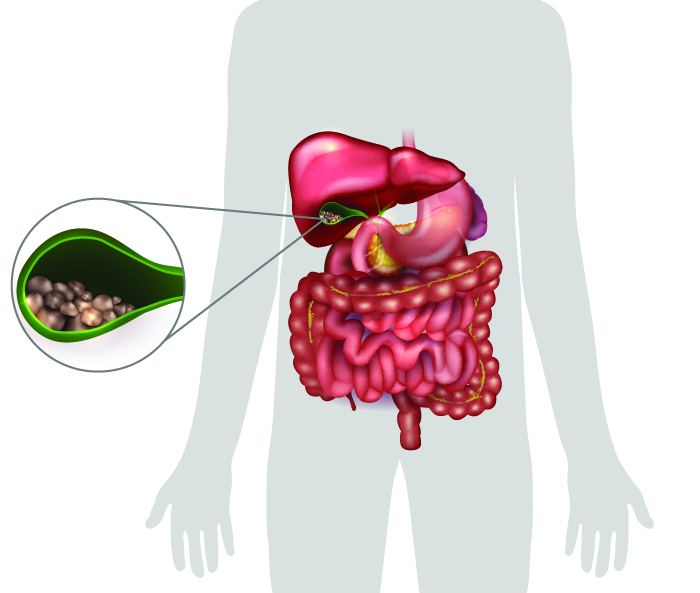Gallbladder Stone Treatment & Diagnostics in Tardeo, Mumbai
Gallbladder Stone
Gall stones are deposits of digestive juices that have hardened in your gallbladder. They are formed in the gallbladder which is a small digestive organ present on the right side of your abdominal region. It is home to the digestive fluid which is called bile.

What do we need to know about gallbladder stones?
Gallstones are a very common condition in the general population. There are multiple sizes of gallstones, ranging from a few millimeters to some centimeters in diameter. In some cases, only one gallstone is developed while in certain people, multiple gallstones develop at the same time.
To seek treatment, you can search online for a general surgery doctor near me or a general surgery hospital near me.
What are the symptoms of gallstone development?
It is important to understand that gallstones themselves don’t cause any signs or symptoms. But when the gallstones get lodged in a duct and lead to its blockage, then it may indicate the onset of the following signs and symptoms:
- Pain in the upper right region of the abdomen
- Pain in the center of the abdomen
- Back pain
- Pain in the right shoulder
- Nausea
- Vomiting
What are the causes of gallstones?
The exact causes of the development of gallstones are not yet known. However, doctors believe that certain causes may hasten the development of gallstones:
- Excess cholesterol in bile
- Excess bilirubin in bile
- Failure of emptying of the gallbladder
When should you consult your doctor/healthcare provider?
It is important to seek the advice of your healthcare provider if you experience any of the symptoms mentioned above. However, you should seek immediate medical attention if you have:
- Sudden pain in the abdomen with extreme intensity
- Yellowing of skin
- High fever with chills
You can request an appointment at Apollo Spectra Hospitals, Tardeo, Mumbai.
Call 1860 500 2244 to book an appointment.
What are the risk factors?
There are certain risk factors that are associated with the development of gallstones. They include:
- Age 40 or above
- Overweight/obese
- Sedentary lifestyle
- Pregnancy
- High-fat diet
- Low-fiber diet
- Diabetes
- Liver diseases
- Oral contraceptive pill consumption
- Hormone therapy
What are the complications that are associated with this condition?
Leaving the gallstones just as they are may lead to multiple complications in the future.
- Gallbladder inflammation - When a gallstone gets lodged in the gallbladder duct and leads to its blockage, cholecystitis or inflammation of the gallbladder can occur. This causes severe pain and fever.
- Blockage of common bile duct - Gallstone lodging in the common bile duct may lead to jaundice and severe infection.
- Blockage of pancreatic duct - In case of gallstones causing a blockage in the pancreatic duct, multiple problems like pancreatitis and excessive abdominal pain can occur.
- Gallbladder cancer - People who have a history of gallstones have a higher risk of gallstone cancer. Although gallbladder cancer is a very rare type of cancer, the risk is higher in people with gallstones.
How can we prevent gallstones?
- Avoid skipping meals - The usual mealtime should be adhered to strictly each day. Fasting is not advised in such conditions.
- Weight loss - Loss of weight should never be rapid in these cases since faster weight loss increases the risk of gallstone production.
- Consumption of high-fiber food - It is vital to include fruits, vegetables and whole grains in your diet regularly.
- Healthy weight – It is critical to maintain a healthy weight because gallstones have been linked to obesity and high consumption of calories.
What are the treatment options?
- Cholecystectomy - It is the surgery for removal of the gallbladder.
- Medications - These are administered to dissolve the gallstones.
Conclusion
Gallstones are a common condition that affects many people. If you suffer from the signs and symptoms, then consult your healthcare provider or family doctor. You may eventually be referred to a gastroenterologist or an abdominal surgeon.
Medications for gallstones aren't commonly used and are reserved for people who can't undergo surgery.
Medications you take orally may help dissolve gallstones. But it may take months or years of treatment to dissolve your gallstones in this way, and these are likely to form again if treatment is stopped
Once your gallbladder is removed, bile flows directly from your liver into your small intestine, rather than being stored in your gallbladder. You don't need your gallbladder to live and gallbladder removal doesn't affect your ability to digest food. But it can cause diarrhea, which is usually temporary.
Our Top Specialities
NOTICE BOARD
CONTACT US
CONTACT US
 Book Appointment
Book Appointment


.svg)
.svg)
.svg)
.svg)








